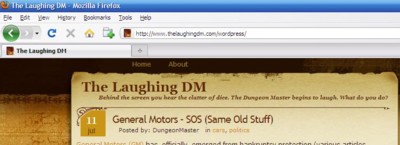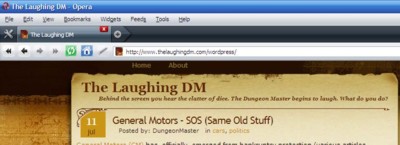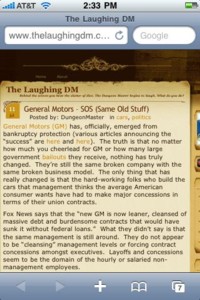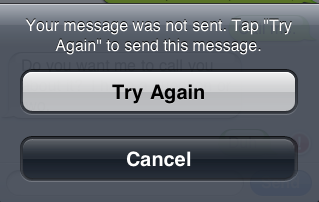Many letter writers in the local newspaper, The Daily News, argue that the United States of America was founded as a “Christian Nation,” that is now a “Christian Nation,” and that it must remain a “Christian Nation.” The local writers aren’t the only ones making the argument; it appears in many newspapers, on television shows with Christian themes, and on numerous web sites. The topic of the “Christian Nation” of the USA is increasingly relevant in the modern world as many people in predominately Muslim countries see the policies and rhetoric of the USA towards them as the resurgence of the Crusades.
The argument that the United States of America is a “Christian Nation” generally proceeds from the claim that the Founding Fathers were Christians. Following from that is the observation that the Declaration of Independence contains the phrases “to which the Laws of Nature and of Nature’s God entitle them” and “they are endowed by their Creator with certain unalienable Rights” and that these, necessarily, establish that the United States of America was founded as a Christian nation [emphasis added in both quotations].
Neither the phrase “Nature’s God” nor the phrase “their Creator” specify the Christian god. “God,” in the western tradition, is often synonymous with the Christian god, though not exclusively. It can easily be used by adherents of any faith such as Christians, Jews, Muslims, Baha’is, and many others to refer to their deity. “Creator” is still more ambiguous and could be interpreted by some as the Universe itself as “their Creator.”
The Constitution, the founding and basic law of the United States of America, says only that “Congress shall make no law respecting an establishment of religion, or prohibiting the free exercise thereof” and then only in the First Amendment to the Constitution. This basic law prohibits Congress, and, by extension, state and local governments, from establishing a state religion. Government is also prohibited by the First Amendment from interfering with the religious faiths established by the citizens and the practice of those faiths. Government is to remain neutral on the subject of religion; it is to neither promote nor restrict the exercise of any particular faith nor is it to promote or restrict faiths in general.
The two documents that establish the legal basis for and the basic law of the United States of America say little about religion in the abstract and nothing whatsoever about the United States of America being founded as a “Christian Nation.”
The founders were wise to record nothing in these basic documents with respect to religion. They knew that just they had to compromise on many issues founding a new nation such as the structure of the government, the keeping of slaves, taxes, the rights of the states vs. the federal government, the role of the military, and the rights of the individual vs. the government that compromise and respect for people of all faiths, including those who did not express a faith, would be key to holding the nation of diverse beliefs together.
A quarter millennia ago the Founders were not far removed from the great religious wars of Europe. In fact, many of the Founders owed their presence in North America to to their parents and grandparents having fled religious persecution in Europe. We easily remember the Puritans, but there were many other Christian sects that felt that the freedom that North American offered was better than Europe.
Certainly, most Americans throughout history and today have self-identified as “Christian” whether they truly practice their version of the faith or not. America, perhaps more so than any other nation, has large minority populations practicing other faiths. This is a good thing; it brings strength through diversity of thought guided by varying religious principles. This is particularly true when members of different faiths are willing to compromise due to the sound ideas of others.
A major point of debate is whether or not some people who claim to be members of the Body of Christ actually are. Catholics are commonly accused of “not being Christians.” The reasoning for this accusation is beyond the scope of this discussion. If Catholics were eliminated from the numbers of self-identified Christians, it would bring the percentage of Christians in the USA down to a bare majority. According to the American Religious Identification Survey (ARIS) 2008, 76.7% of Americans are Christian (the survey is summarized here). If Catholics are removed from this number then the percentage of Americans self-identified as Christian falls to 50.9%. Other denominations are also often accused of “not being Christian.”
Unlike some nations, Americans are not required to state a religious faith to the government and be bound by that statement of faith. (Egypt is an example where religious registration is mandatory.) Consider too that because no official registration of faith is required that Americans are free to change religion at will as their own spiritual journey dictates. In some locations, particularly in Muslim areas that implement Sharia Law, it is impossible to openly change one’s faith; to do so is to invite a formal death sentence from the government or from the religious authority or to be tried and executed by local vigilantes.
The Founders did not establish a state religion or laws that allowed the state intervene in religious affairs because they feared the tyranny, repression, and violence it could propagate. Their bequest of religious freedom enables us to undertake a national spiritual journey in much the same way as individuals. We may some day become a nation of Muslims, Buddhists, Baha’is, atheists, or, even, agnostics. And that is what we truly are: a Nation of Freedom.















